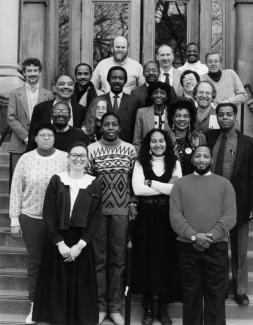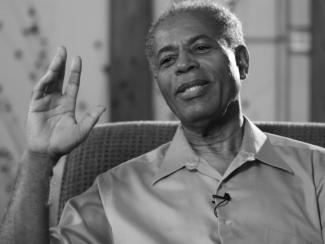Above: Bunyan Bryant receiving the Ecology Center’s annual award for environmental activism, 2008, presented by staffers Jeff Gearhart, Tracey Easthope, Charles Griffith, and Mike Garfield, all former students of Dr. Bryant.
“Looking back, I can see that my story was an unpredictable one. Yet I also know that I am far from unique. There are millions of Black youngsters who come from humble backgrounds who need to be nurtured and mentored as I was. Like them, I suffered from a lack of opportunities and the persistent impact of racism. I made it onto the right path with the help of some good fortune…Along the way, I was encouraged by both Blacks and whites who wanted me to succeed.”
– Bunyan Bryant, Jr.
Last year, Bunyan Bryant, Jr. published, “Educator and Activist: My Life and Times in the Quest for Environmental Justice,” a vivid narrative of his life journey from growing up in a poor neighborhood in Arkansas to becoming a world-renowned pioneer in environmental justice. As a former board member, professor to many staff, and a founder of the national environmental justice movement, Bunyan was a spark that helped ignite the Ecology Center’s 53-year legacy in environmental activism. To celebrate the release of his most recent book and his impact on our organization, we wanted to reflect on the remarkable ways in which he influenced our work, and the world.
As a professor at the University of Michigan, Bunyan participated in the very first Teach-In on the Environment in March 1970, which led to the national teach-in we now recognize as Earth Day and the formation of the Ecology Center.
He served as a board member during the early 1970s, soon after the Ecology Center’s formation. But more profoundly, Bunyan’s influence is deeply embedded in the fabric of the Ecology Center through his role as mentor, teacher, and collaborator with most of the long-term staff at the Ecology Center. Current and former staff members working to address environmental justice, air pollution, climate change, and toxics in consumer goods and the environment were students of Bunyan, or worked on projects with Bunyan.
Bunyan believes in empowerment education – that students can and should direct their own learning, follow their interests and passions, and see themselves as full actors in the world, with the ability and agency to both see what is around them and change things for the better. That thinking helped shape the Ecology Center’s approach to environmental advocacy and justice. Communities should be full participants in the decisions that affect them. As an organization fighting for change, the Ecology Center believes we must fight alongside those most impacted, guided by their agenda and their needs.

Bunyan’s influence on our organization dates back to the first executive director of the Ecology Center, Mike Schechtman.
Mike recalled Bunyan’s outstanding first impression. As part of the hiring process to become faculty for the U-M School of Natural Resources and Environment (then called the School of Natural Resources [SNR], now called the School for Environment and Sustainability [SEAS]), Bunyan delivered a lecture, “The Myth of Value Free Research.”
Noted Mike:
“Bunyan’s lecture was hugely attended – especially by SNR faculty members who prided themselves on the caliber of their research methodologies and publications. Bunyan highlighted how everyone brings their worldview to their research, the lens of their own race, class, and ethnicity that frames how issues are identified and defined. This influences choices regarding data to be gathered, audiences to be engaged, voices to be heard, and literature to be reviewed. It was a mind-blowing lecture with people talking intensively in the following days.
Needless to say, Bunyan received the faculty appointment, and that summer, Bunyan and Jim Crowfoot began the development of SNR’s Environmental Advocacy Program.”
By his own admission, in his memoir, “Educator and Activist: My Life and Times in the Quest for Environmental Justice,” Bunyan had not been interested in the environment. Writes Bunyan, “I knew nothing about natural resources or the environment, nor was I interested in these topics.” However, his transition to this new environmental advocacy program at the University of Michigan fundamentally shifted the environmental movement and greatly impacted the Ecology Center’s work and legacy.
Bunyan was educated as a social worker and started his career as a youth counselor at the Fresh Air Camp, a treatment and research program for severely traumatized children. He later worked as a social worker at Michigan Children’s Institute. He quickly noticed the discrepancies in treatment between white and Black children and took action to address these differences.
After experiencing housing discrimination, he helped advocate for a fair housing ordinance in Ann Arbor, Michigan, one of the first such ordinances in the state. He later became an advocate with the Congress of Racial Equity (CORE), a racial justice organization that emerged from his work on fair housing. He also participated in the Guild House Campus Ministry, an ecumenical Christian organization at U-M that provided space for students, faculty, and staff to raise questions about discriminatory policies.
In 1970, Bunyan participated in the Teach-In on the Environment, a vanguard event in environmental activism that precipitated a national movement of ecological stewardship along with a sweeping set of federal policy laws passed to better preserve the environment. The teach-in also caused a prompt increase in student interest in environmentalism, particularly around the intersection of environment and social justice.
The high demand for education led to the formation of U-M’s Environmental Advocacy Program, and in 1972, the university asked Bunyan if he would join the new school’s faculty. He accepted and, alongside Jim Crowfoot, Bill Stapp, and Peter Sandman, built the Environmental Advocacy Program program that continues today, renamed the Environmental Justice Program in 1990. Unbeknownst to him then, he would also help inspire a global movement, hundreds of U-M students, local, state, federal, and national governments, resident activists, grassroots movements, non-profit organizations, and the Ecology Center staff.
The first and, for a time, only Black professor at the School of Natural Resources, Bunyan found himself marginalized. There, though poorly resourced, the school left him alone, and he found himself able to do what he liked and shape the program as he thought necessary to teach students how to organize communities around environmental issues.
And shape it, he did. Bunyan taught creatively, bringing his students on mini-retreats, environmental justice tours, and field trips, practicing role-playing and small discussions in his classrooms, and empowering students to apply their unique worldviews to problem-solving and critical thinking. With his long-time collaborator Paul Mohai, he hosted the Michigan Conference on Race and Incidence of Environmental Hazards: A Time for Discourse, the first academic conference of mainly Black scholars to discuss the disproportionate effects of environmental hazards on marginalized populations, from which a seminal book of the same name was published, featuring the work of the conference presenters. The group’s work encouraged the EPA to address environmental justice and form the Environmental Equity Work Group in 1992.

Tracey Easthope, the Ecology Center’s senior strategist, attended one of the program’s first events which introduced the idea of environmental justice.
“As an academic, he was a spark. But at the center of it, he emanated this beautiful, accepting, calming, loving spirit,” said Tracey. “He was so welcoming, so generous to everyone and so nonjudgmental. He really believed in students, and you could feel it. He respected students immensely, and believed in their power and agency and idealism - and he supported us in real world projects to address injustice. He believed young people could change the world, so we believed it too.”
The Ecology Center’s Director, Mike Garfield, recalled, “I was Bunyan’s student in the early 1980s. He was unlike any teacher or professor I’d ever had and left an indelible impression. He found remarkable ways to prepare us to take on powerful economic and political forces, and make real change in the world. He inspired his students to stand proudly and humbly in the struggle for justice.”
Bunyan Bryant was indeed a light illuminating the path of countless activists, communities, and movements, both here in Michigan and across the globe, toward a brighter, more equitable future. The creativity and inventiveness that he applied in his pedagogy inspired his students to believe they could change the world and he equipped them with the tools to do so. An example of this is the inspiration he had on the Ecology Center. His work touches everything we have done and everything we do. His impact is a testament to the divinity of bringing your whole self to your work, including the parts society may have marginalized you for, and knowing these qualities are an asset, not a detriment.
Bunyan explains it best in his 2022 memoir on his life of activism and the legacy he has given to so many of us:
“I didn’t choose this. It chose me… I believe those eloquent words speak for most of us in the environmental justice movement. As I look back on my life and work, I can see that I didn’t become an environmental advocate, researcher, educator, activist, and mentor because of some well-thought-out career path… It happened because of the challenges I faced as a Black male in a society that puts barriers in the path of Black males – barriers that made me ask tough questions about my place in the world, and drove me to work harder than I otherwise might have to overcome the roadblocks in the way.”
We are endlessly grateful for Bunyan’s work and impact on our organization. Thank you, Bunyan, for your lifelong dedication to environmental justice and your steadfast commitment to always being a teacher, reminding each of us of our own power to make the world more just, and of the importance of lifting others up to be their own advocates for justice.


